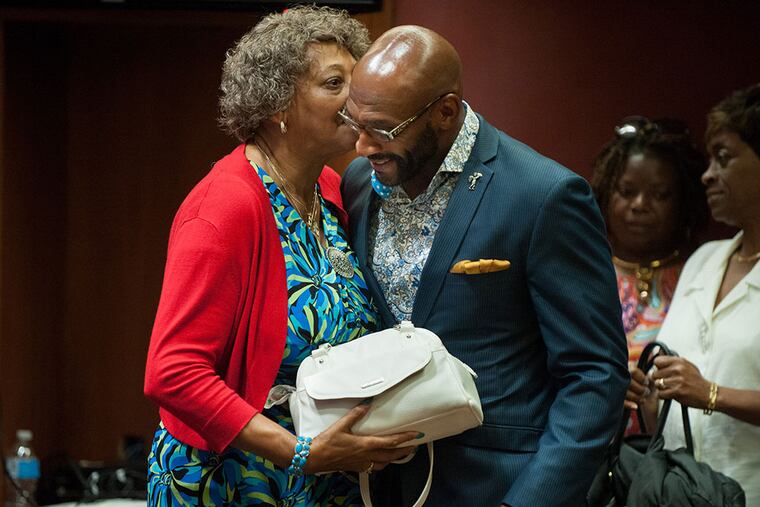Fryar, mother ask judge to overturn guilty verdicts
Alleging a "miscarriage of justice," attorneys for former NFL star Irving Fryar and his mother are urging a judge to either overturn a jury's verdicts convicting the two in a $1.2 million mortgage fraud or grant a new trial.

Alleging a "miscarriage of justice," attorneys for former NFL star Irving Fryar and his mother are urging a judge to either overturn a jury's verdicts convicting the two in a $1.2 million mortgage fraud or grant a new trial.
Motions filed by the defense in Superior Court in Mount Holly late last week say the convictions came despite a lack of evidence and because of prosecutorial misconduct.
Fryar, 54, a wide receiver who played for the Eagles and several other teams, and Allene McGhee, 74, a retired school bus driver, are both free on bail. If Judge Jeanne T. Covert denies the motions, the two are scheduled to be sentenced on Oct. 2. Each faces up to 10 years in prison and up to $150,000 in fines.
"The prosecution made the inflammatory statement that the defendants should . . . 'go to jail,' that there is 'only one conclusion,' and that the jury 'must' find them guilty," Mark A. Fury, McGhee's lawyer, said in a 20-page motion.
The remarks by state Deputy Attorney General Mark Kurzawa prejudiced the jurors, Fury said.
Courts have ruled that prosecutors should show restraint and not provide their personal opinions because jurors may be influenced by the office that the prosecutors hold, Fury said.
Michael Gilberti, a former federal prosecutor who represents Fryar, said in his eight-page motion that the prosecutor made "improper and prejudicial statements" in his closing arguments before the jury, and presented charts that contained erroneous financial information, contrary to evidence.
"We do not have any comment on the motions filed by the defense," Peter Aseltine, a spokesman for the Attorney General's Office, said in an email.
When the verdicts were announced, acting Attorney General John J. Hoffman said in a news release that Fryar and his mother "engaged in an elaborate criminal scheme to defraud seven banks" between October 2009 and January 2010.
The state laid out a case that McGhee used fraudulent information to purchase and obtain a mortgage on Fryar's house in Springfield Township, Burlington County, after it went into foreclosure and was acquired by a bank.
She also applied for six home equity lines of credit in quick succession from six banks, using only her Willingboro house as collateral and without disclosing the multiple applications to each of the banks.
In the applications, she provided false wage information, claiming she earned more than $72,000 as an event planner at the church Fryar founded, the New Jerusalem House of God in Mount Holly, where he is a minister.
The defense contended that McGhee and Fryar were both duped by William Barksdale, a former mortgage broker who is now in federal prison for defrauding at least 10 banks out of more than $2 million. Barksdale, who testified against the two at trial, said he had set up the scheme and given Fryar money when the loans were approved.
Barksdale also said that all of the loan money McGhee obtained was placed into his account, since he was the mortgage holder on McGhee's house. He said that he arranged the closings, helped McGhee fill in the applications, and then took her to the banks.
Fury cited testimony by Barksdale that McGhee was unaware of the scheme and had continued to make mortgage payments to a bank until she lost her house to foreclosure two years later.
"In my career, I've never seen a case more ripe for judicial intervention. This result is wrong. It is logically unsupportable. It is unjust. And it has shocked every observer, including, I think, the court itself," Fury said in his motion. "The court must act to prevent injustice whenever the jury verdict 'shocks the court's conscience.' "
After the trial, Fury said that McGhee, a widow, now lives at her daughter's house in Texas. In an interview, Fury said he has been practicing law for 30 years and the verdict came as a shock.
Both McGhee and Fryar have declined comment.
Gilberti said in his motion that Fryar, too, had no knowledge of the scheme.
"The only evidence that Mr. Fryar knew anything about this scheme came from Barksdale," and it was "unsupported, uncorroborated testimony," he said in the motion. "According to all of the bank witnesses, Mr. Fryar did not attend any of the closings" on the loans, and there was no evidence that he "knew of the false W-2s or pay stubs" that Barksdale had dropped off at the banks.
Fryar and Barksdale had worked on business ventures in which they rehabilitated and sold houses, and Fryar did not know that some of the money Barksdale paid him had come from the mortgage fraud scheme, Gilberti said.
The state argued that Fryar got more than $300,000 from the scheme and that McGhee got the mortgage that Barksdale held on her house paid off. The Attorney General's Office has not yet filed responses to the defense motions.